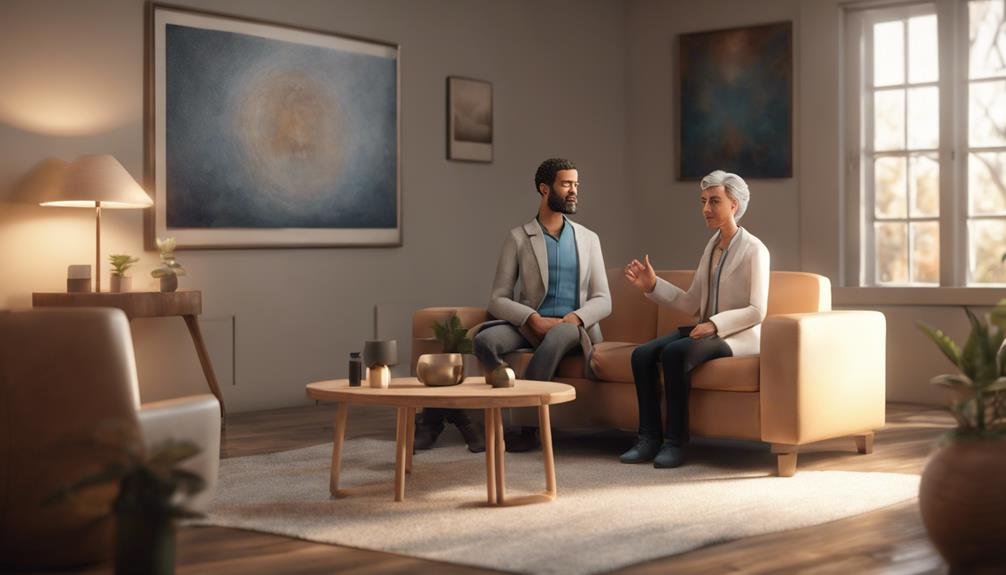The Role of Unconditional Positive Regard in Rogers’ Theory
As you contemplate the significance of Unconditional Positive Regard in Rogers' Theory, you might find yourself drawn to the profound impact it has on therapeutic relationships. The notion that acceptance without judgment can pave the way for genuine connection and growth is indeed compelling. But what exactly is the mechanism behind this transformative power, and how does it influence the therapeutic process? Stay tuned as we unravel the layers of Unconditional Positive Regard and its role in fostering meaningful change and healing within the therapeutic setting.
Key Takeaways
- Essential for fostering genuine therapeutic relationships.
- Creates a nonjudgmental and safe space for clients.
- Forms the basis of a strong therapeutic alliance.
- Encourages clients to explore thoughts and feelings openly.
- Facilitates personal growth and healing through acceptance.
Understanding Unconditional Positive Regard
To grasp the concept of Unconditional Positive Regard in Rogers' theory, it's essential to understand its foundational role in fostering genuine therapeutic relationships. This approach requires the therapist to maintain a nonjudgmental attitude towards the client, accepting them wholly and unconditionally. By embodying this nonjudgmental stance, the therapist creates a safe space where the client feels understood and accepted for who they are. This genuine connection forms the basis of the therapeutic alliance, allowing the client to explore their thoughts, feelings, and experiences openly.
Through Unconditional Positive Regard, the therapist communicates empathy and understanding to the client without imposing personal beliefs or values. This approach helps build trust and encourages the client to engage authentically in the therapeutic process. By demonstrating acceptance and genuine care, the therapist establishes a foundation for growth and self-exploration within the therapeutic relationship.
Building Trust and Empathy
Establishing trust and empathy forms the bedrock of effective therapeutic relationships in the context of Unconditional Positive Regard. Trust building is a fundamental aspect of the therapeutic process as it lays the foundation for open communication and vulnerability. In a therapeutic setting, trust is cultivated through consistent support, confidentiality, and genuineness from the therapist. Clients are more likely to engage in the therapy process when they feel secure and believe that their therapist has their best interests at heart.
Empathy development is equally important in fostering a strong therapeutic relationship. Therapists must show empathy by actively listening, understanding the client's emotions, and demonstrating compassion. Empathy helps clients feel validated and understood, creating a safe space for them to explore their thoughts and feelings without fear of judgment. By empathizing with clients, therapists can build rapport and convey a sense of care and acceptance.
Enhancing Client Self-Esteem
Promoting client self-esteem is an essential component of the therapeutic process within the framework of Unconditional Positive Regard, as it plays a significant role in fostering personal growth and emotional well-being. By cultivating self-acceptance and empowerment, therapists can help clients develop a positive self-image and a sense of worth. This process involves instilling confidence in clients by acknowledging their strengths and capabilities, ultimately leading to enhanced self-esteem.
Validation is an important aspect of enhancing client self-esteem within the therapeutic relationship. By providing genuine validation of clients' experiences, feelings, and perspectives, therapists can help clients feel understood and accepted. This validation contributes to building a foundation of trust and openness, allowing clients to explore their thoughts and emotions more freely.
Facilitating Authentic Communication
Facilitating authentic communication is a fundamental aspect of the therapeutic process within the context of Unconditional Positive Regard, enabling clients to express themselves openly and honestly.
Active listening plays a pivotal role in this process, where the therapist focuses on understanding the client's words, emotions, and underlying meanings. By actively listening, the therapist demonstrates genuine interest and creates a safe space for the client to share their thoughts and feelings without fear of judgment.
In addition to active listening, providing an empathetic response is essential in facilitating authentic communication. When clients feel understood and validated through empathetic responses, they're more likely to deepen their trust in the therapeutic relationship and feel comfortable disclosing their innermost struggles.
Empathy helps clients feel heard and accepted, fostering a sense of connection that's crucial for meaningful communication to occur.
Promoting Personal Growth and Healing
Encouraging clients to reflect on their experiences can catalyze personal growth and healing within the therapeutic process. By developing self-awareness, individuals can gain insights into their thoughts, emotions, and behaviors, leading to a deeper understanding of themselves and the issues they face. This self-reflection promotes personal growth by empowering clients to make positive changes in their lives based on newfound awareness.
Furthermore, fostering resilience is another key aspect of promoting personal growth and healing. Through unconditional positive regard and a supportive therapeutic environment, clients can build the strength and skills needed to overcome challenges and bounce back from setbacks. This resilience allows individuals to navigate difficult situations with a sense of self-efficacy and adaptability, promoting healing and growth in the face of adversity.
Conclusion
Ultimately, the concept of Unconditional Positive Regard in Rogers' Theory serves as a cornerstone for fostering genuine therapeutic relationships. By embodying acceptance and nonjudgment towards clients, therapists create a safe environment for personal exploration.
Through this unconditional acceptance, individuals can feel valued, understood, and respected, leading to enhanced self-esteem, authentic communication, and personal growth.
Essentially, Unconditional Positive Regard plays a pivotal role in facilitating healing and self-discovery in the therapeutic process.







